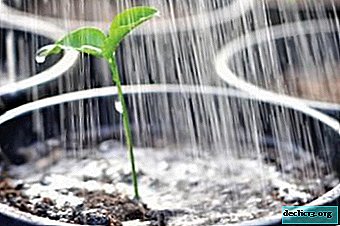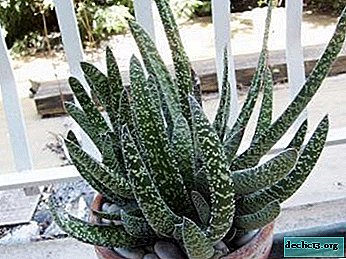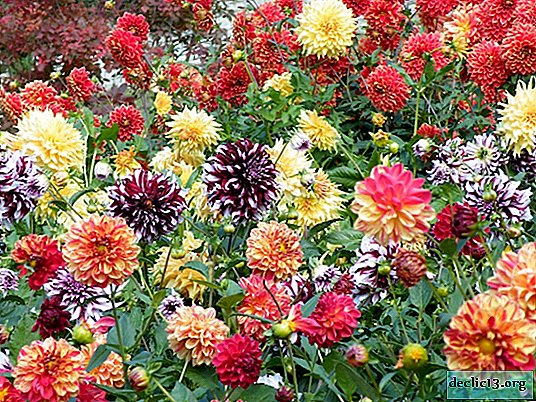What will help to maintain the health of a citrus tree: how to water a lemon, including at home in a pot?

To grow a citrus tree at home is possible only if certain rules of watering the plant are observed.
Proper care is the key to a beautiful and healthy tree. Ignorance of how to water a lemon can adversely affect it or provoke illness.
For the health and beauty of citrus, it is important to follow the watering regimen. If you follow only a few simple rules, a lemon will delight not only with its appearance, but also with its fruits.
How often is the lemon tree watered?
 It is important to irrigate the lemon as necessary, but the main thing is regularity. You should not leave the plant without water for a very long time, but you should not abuse it.
It is important to irrigate the lemon as necessary, but the main thing is regularity. You should not leave the plant without water for a very long time, but you should not abuse it.
Irrigation frequency also depends on air temperature. In warm periods of the year, lemon tree should be watered 1-2 times a day, and in cold periods 2-3 times a week will be enough.
It is very important to observe the above rule on the frequency of watering, because the well-being of the plant depends on this.
Influence of air temperature and season
How often is it recommended to water the lemon in summer and winter, including at home? In winter, it is better to moisten the soil in the evening: during the night, the plant will better compensate for the shortage of water. In summer, citrus is watered in the morning and evening, since the air temperature is lower, there is no scorching sun and moisture does not have time to evaporate. In the warm season, citrus needs more moisture, so they irrigate the plant more abundant in summer than in winter.
Growing place
In spring and summer, indoor lemon can be taken out to the garden or to the balcony. In the open air at a temperature above +29 degrees, the plant will receive more heat and light from the sun. Outdoor citrus trees are watered with plenty of water, as moisture in the street evaporates faster than at room temperature.
When does citrus need moisture?
To understand that the plant needs to be watered, take a small handful of soil from the roots and squeeze it with your fingers. If the earth crumbles, then citrus needs water, and if it sticks together, then there is enough moisture. You can determine whether to water a tree by looking at the color of the earth: dry soil is gray.
Pay attention to the weight of the pot: with dry soil, it weighs significantly less than with wet. If the leaves fold into a boat or the shoots grow dull, then this is also a sure sign that the plant needs water.Water use
 In the care of citrus, water must be given special importance, since a liquid unsuitable for irrigation will kill the tree. The most suitable for irrigation is rain or melt water. In no case should you moisten the soil with tap water. It contains chlorine, lime and other substances that harm the plant.
In the care of citrus, water must be given special importance, since a liquid unsuitable for irrigation will kill the tree. The most suitable for irrigation is rain or melt water. In no case should you moisten the soil with tap water. It contains chlorine, lime and other substances that harm the plant.
Tap water contains mineral salts that form plaque on the surface of the earth, which interferes with the absorption of elements of zinc, iron and manganese.
With their deficiency, the tree begins to hurt or slows down in growth. If, after watering, the topsoil is covered with mold or white coating, then the liquid is not suitable for citrus.
Does it need to be defended?
There are several options for making water suitable for irrigation:
- Water sedimentation - One of the most effective methods to make water safe for lemon. Pour water from the tap into a wide-necked container and leave it for 24 hours. During this time, chlorine and lime will leave the liquid. So there will be no harm to the plant.
- Filtration. Pass the tap water through the filter, then it will be cleaned of more impurities and harmful substances. Such a liquid can harmlessly water the plant.
- Boiling. Boil water and cool to room temperature. So there will be no harmful impurities, but the amount of oxygen useful for plants will be reduced.
Optimal degree
Ideal water temperature is 2-3 degrees above ambient temperature. But it’s harmful to pour lemon over 35 degrees.
Is it necessary to add something?
- Adding impurities will also soften water and kill harmful substances. You can add acetic (5-6 drops per liter), citric (0.5 grams per 3 liters) or oxalic acid (2 grams per 10 liters).
- However, succinic acid is the most beneficial. It not only softens the water, but also has a beneficial effect on the health of the tree, stimulates plant growth and strengthens the roots. Succinic acid is also useful for the soil: it cleans the soil of contaminants and improves its microflora.
- Suitable for irrigation water will also make half a teaspoon of wood ash (for every liter of water) or fresh peat. Wrap 50 grams of peat in a cloth or gauze and dip in 5 liters of water per day.
How to irrigate correctly?
At home in a pot

- Check if the plant needs watering.
- If the ground is dry, then water the tree in two passes. At the first, water irrigates only the surface of the soil. To water penetrated into the earth after a while, water again.
- It is necessary to irrigate citrus slowly so that the water reaches all parts of the roots and soil. It is recommended to use a watering can with a long nose to better control the volume of fluid. Quick watering will cause water to pass through the drainage holes and the soil will not absorb moisture. Do not leave dry places on the entire surface of the earth.
- Watering is recommended until water begins to appear at the bottom of the pan.
- After the soil absorbs all moisture, drain the water from the sump so as not to form stagnant water.
In the open ground
- Remember that lemon in the ground also receives rainwater, therefore do not forget to check the soil before watering.
- Water not only around the trunk of the tree, but also around it for 10-15 cmso that all the roots get enough water.
- Take your time. Irrigate abundantly, but slowly, that does not flood the roots of the tree.
- In the hot season, avoid dropping water on the leaves.as moisture causes burns under the scorching sun.
The consequences of sparse watering
Improper watering of lemon is the most common cause of plant disease. If moisture is not enough, the leaves of the tree will turn yellow and fall off and the lemon will wither. Lack of moisture will kill the plant.
Excess fluid
Too much water is also dangerous. From a large amount of liquid, the earth acidifies and the roots begin to rot. therefore it is very important to follow the rules and watering regime. The health and appearance of the tree depends on this.
Spraying
Subtropics - a habitual environment for citrus fruits. Therefore, they are used to high humidity. For citrus, air humidity is very important, so it is important to spray the tree constantly.
What is this for?
When spraying, not only the plant itself is moistened, but also the air around it, creating comfortable conditions for citrus. Spraying is necessary to clean the leaves and trunk of the tree from accumulated dust. Regular spraying protects the plant from parasites living in a dry environment.
How and what to do the procedure?
Attention! The tree should be sprayed daily. Remember that this procedure does not replace watering, but only supplement it. Water, as well as for irrigation, should be soft, cleaned from harmful substances.Use a spray gun to distribute moisture evenly across all leaves of the tree. Do not spray the tree in the sunas moisture drops form burns. Therefore, lemon should be sprayed in the morning or in the evening.
It is not difficult to follow all the rules for citrus watering, the main thing is regularity. If you properly water the lemon, then it will be not only healthy, but also beautiful in appearance. Remember that starting a plant and ruining it is simple, but bringing it back to life is difficult and sometimes impossible.
Watering is the main component of lemon health. To care for the lemon correctly, monitor the condition of not only the tree and fruits, but also the soil, since the favorable growth of citrus also depends on the soil.

















